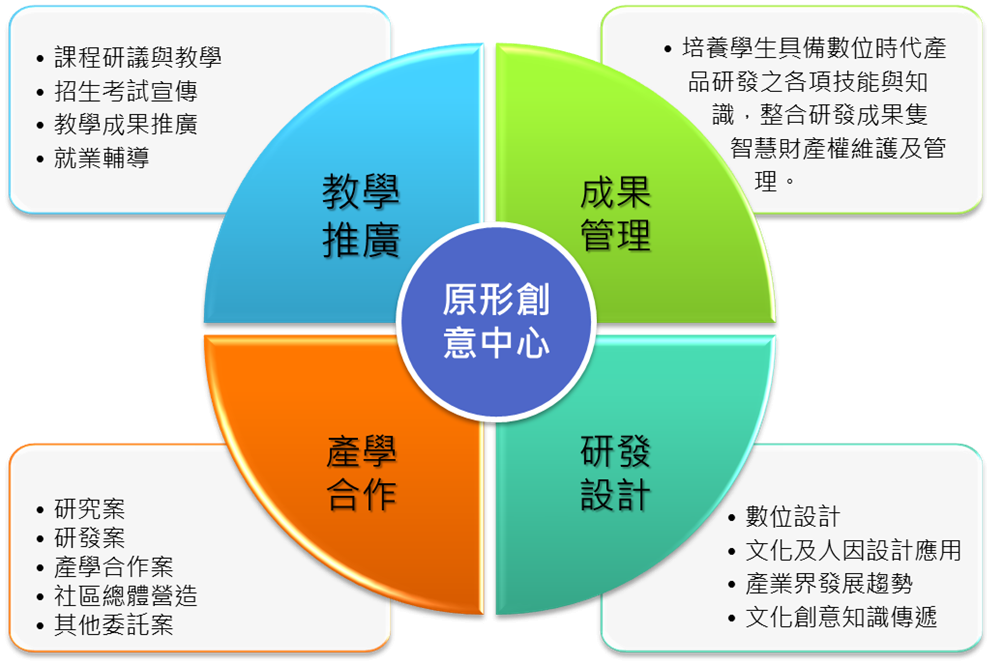Prototype Creative Center
Contact information
單位名稱 Prototype Creative Center (原形創意中心)
總機號碼 05-5342601
分機號碼 6149
傳真號碼 05-5312196
聯絡電郵 Cox20085@yuntech.edu.tw
About the Center
Under the relentless efforts of collaboration among several professors in our design college, The Original Creative Center (TOCC) was founded in 2004 as a professional sector with the understanding that, to enhance industrial competitiveness and to bring industries in Taiwan to the international stage, different professional fields had to be integrated together. The center started its operation on 1/1/2005. Multiple industry-university collaboration projects were initiated with the spirit of design education and with the goal to create a win-win opportunity for our school’s reputation and the development of the industries.
According to the Cultural and Creative Industry Development Plan in the Challenge 2008: National Development Plan proposed by the Administrative Yuan in May, 2002, creative designing was listed as an important developmental goal. By increasing the ability to design daily supplies creatively, businesses can get assistance to develop new products and new talents can be formed simultaneously. With strategies focusing on product creativity, product refinement and market segmentation that make our industries more advantageous, we aim to build our own brands and once again sell our products all around the globe. By introducing new techniques, new product developing methods and enlarging international marketing information network that our businessmen are currently short of, they can understand the idea and process of R&D and marketing. Phasing out from OEM producing model into the ODM, own designing and manufacturing model and the new level OBC, self branding and manufacturing, we aim to root our own businesses in Taiwan.
Central framework
With the spirit to improve designing education and industries, four departments: (education promotion, results management, university-industry collaboration, R&D designing), were set up internally to specialize office work. Through seamless collaboration between the academic field and the industrial field, we offer a more comprehensive education style of design knowledge and industrial techniques.

Center Services
In order to increase the designing efficiency and to shorten the time span of product development, including “idea development”, “3D modeling”, “prototype making” and “fine molding” so that CAD/CAM (computer aided design/manufacturing) can be combined, our center purchased CNC (Computer Numerical Control) in 2007 and simultaneously trained operating personnel to live up to the standard of high speed designing and the ideal to bring education and service together. CNC plays an important role in enhancing the prototypes of our design. Its high-speed operation and precise function make itself an indispensable tool for this center.
In order to make students realize the importance of increasing efficiency and shortening developing time span, we offer this service and accept operating requests based on the facility management protocols of the institution.
Industry - university cooperation model
With the experiences from university-industries collaboration model, we aim to push forward a long term partnership for us and the industries, importing techniques from the industrial field and thus enhancing the overall effect of the collaboration. Moreover, we expect to output the results of our collaboration into products; thus achieving the win-win situation. Furthermore, it is also beneficial for corporates when building strategies for developing product design and when forming marketing strategies for the products, gradually improving the design quality and the blueprint for marketing towards a sustainable goal.
Results of the Original Creative Center
Under the efforts of the head of our center and several committee members, our collaboration projects cover a very wide range of departments, including the ministry of economic affairs, ministry of education, ministry of science and technology, ministry of culture, council of agriculture and middle and small businesses. For example, the National Development Plan, museum souvenirs competition and product manufacturing, industry-collaboration projects and the annual acrylic design competition…etc. They all attract nearly to a thousand competitors to participate, which is a very rich amount. The products include: office items such as office chair and computer table, normal household furniture such as living room set, bedroom set, Home SPA facilities, and recreational chairs, household facilities such as coffee machine, tea set, tea brewer, kitchenware, toilet seat, storage cabinet and audio cabinet, and others such as robots, cellphones, stationeries, stroller, jazz drum parts, driving equipment and guiding sticks for the blinds, etc. They were all well-recognized by the collaborating corporations.